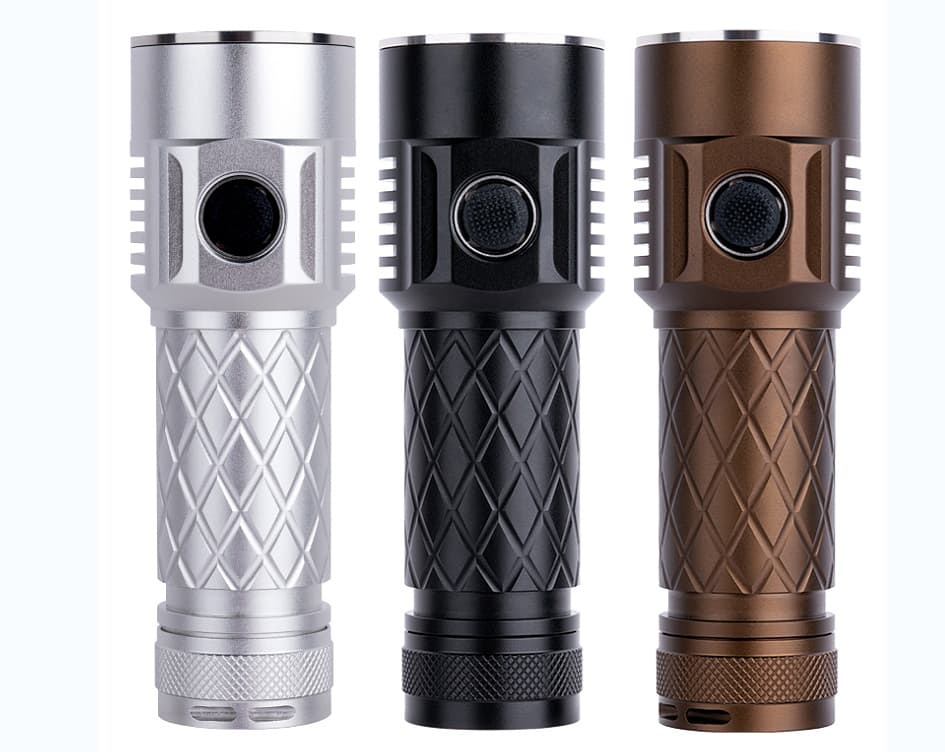Haikelite HK4S Options for Luminus-SST20 / Luminus-SST40 User Manual
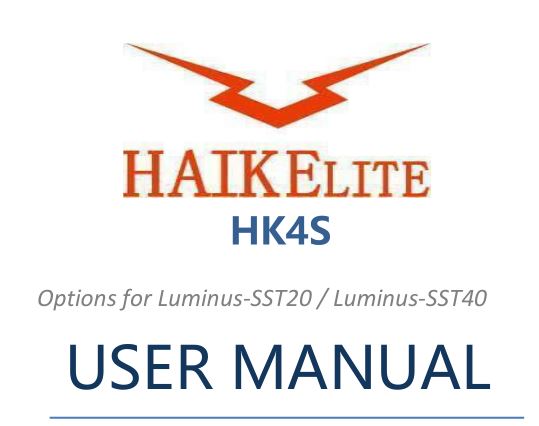
Safety precautions
- Please use high quality power battery (discharge capacity greater than 20a),.
- The flashlight battery uses single lithium 26800, 26650 or 21700, that is, the battery used is power battery.
- Remove and recharge cells when the low voltage indication is given by the Lamp (repeated step downs in light level and eventual shutdown of the light).
- The HK4S is a very high-intensity flashlight. Do not point it directly at a person, animal, moving vehicles or flammable materials. When running at higher output levels the head of the Lamp will quickly heat up. This is normal. In warmer ambient conditions this temperature may exceed 60ºC, so please take the necessary precautions when handling it.
- Open the back of the flashlight and put in the single lithium battery. Ready to use.
- Double check the polarity every time before closing: The lower seated batteries must point with plus (nipple) towards the head. The higher ones must look with plus to the open back! All flat ends look at the springs.
- Screw the battery tube back. The HK4S will flash once when electrical contact is made. Continue to tighten the battery tube to a gentle stop. Do not overtighten.
- There is a very small drain on the battery while OFF. This should not be of any concern, but we recommend removing the cells (or partially loosening the tail-cap) if the HK4S will not be used for several months.
- For the complete user manual and any questions you might have about your HK4S, please visit the support on Haikelite Web. The link is on the last page of this manual.
Basic Parameters
Emitter——————Flux—————— RangeLuminus-SST20———4000LM—————650mLuminus-SST40———7000LM—————500m
Specifications
- Body:6063 aluminum alloy material with type III hard-coat anodizing. Stainless steel head pressing ring.
- Lens:Double-side AR coated toughened glass lens 98% light transmission.
- Reflector:Triple cup reflector from aluminumaluminum, smooth finish
- Color:silvery white/Black/Sand yellow (Option)
- Springs:Silver plated copper alloy with low internal resistance
- Battery:Three Single lithium 26800, 26650 or 21700, that is, the battery used is a power battery.
- Charging:Type-C fast charge port is usable. The indicator light of the switch is red when charging and it changes to blue when fully charged. single 4000MA 21700 cells take about 1.5 hours to fully change.
- Emitter:Four LEDs. Two choices total: Luminus-SST20 or Luminus-SST40, all are the highest rank in cold white (6500K) and neutral white (5000K).
- Ingress rating: IPX7
- Dimension:42mm Ø head x 127mmlength33 mm Ø at the handle
- Weight:N.W180g,G.W 455g
- Packing list:HK4S Flashlight *1O ring *2Product Instruction *1Portable hand rope*1Type-C USB pallet*1
Quick Start
Ramping: To access this mode when the light is off:
- Click: Turn on at the memorized brightness.
- Hold the button to change brightness.
- Release and hold again to change brightness the other way.
TURBO: Single-click or double-clicks, and then double-clicks again for Turbo when the light is OFF
Strobes: Click+ click+ holding button to access the strobe modes when the light is OFF, then double-clicks again switch to cycle forward through the different types of strobes (candle-bike flasher-parte strobe- Tactical strobe-Lightning storm)
Battery voltage check: Click 3 times from Off to enter battery voltage check mode (4 blinks+1 blink=4.1V), then click 2 times again enter to blink modes. (Battery check-sunset mode-beacon mode-Temperature check)
Ramping/Stepped Ramping Switch:3 Clicks to enter Ramping and Stepped Ramping Switch while the light is ON.
Lockout Mode : Click 4 times from Off to enter Lockout mode. To exit lockout mode, click 4 times.
Momentary Mode: Click 5 times from Off to enter Momentary mode, unscrew the battery tube to exit this mode. Momentary mode does either a steady brightness level or a strobe, details refer to Anduril instruction.
Anduril UI Briefing
Ramping / Stepped Ramping ModesAnduril’s normal operation mode uses a smooth ramp or a stepped ramp, depending on which style the user prefers. Each ramp has its own settings — floor (lowest level), ceiling (highest level), and the stepped ramp can also have a configurable number of steps.
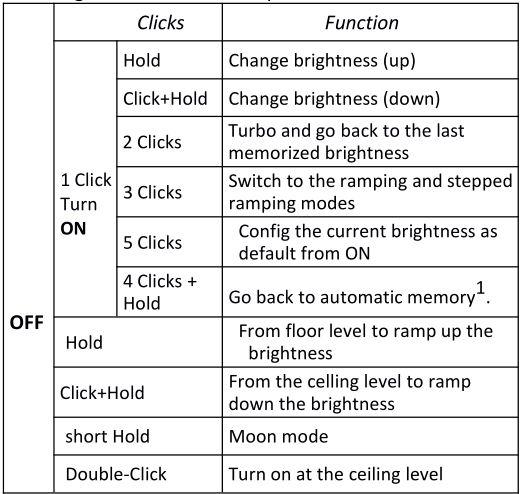
- In automatic mode, it uses the last brightness the user ramped to.
Blinky / Utility ModesClick 3 times from Off to access Anduril’s blinky / utility modes. This always starts at battery check and the user can proceed to other blinky modes from there. The sequence is:

- Battery check mode(4 blinks+1 blink=4.1V),and so on
- This starts at a low level, then dims gradually for an hour, and then shuts off
- To represent a series quick blinks are followed once slow blink
Strobe / Mood ModesAnduril includes a few extra modes for a variety of purposes: 1. Candle mode 1 ;2. Bike flasher 2 ;3. Party strobe 3 ;4. Tactical strobe 4 ;5. Lightning storm mode 5 。
Click 2 times + Hold from Off to access these
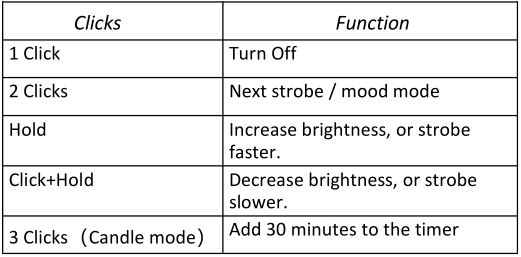
- Candle mode: Brightness changes randomly in a pattern resembling a candle flame
- Runs at a medium level, but stutters to a brighter level once per second.
- Motion-freezing strobe light. Can be used to freeze spinning fans and falling water
- Disorienting strobe light. Can be used to irritate people. Speed is configurable, and the duty cycle is always 33%
- Flashes at random brightness and random speed to simulate lightning strikes during a busy lightning storm. Do not look directly at the flashlight when this mode is running, because it may suddenly go to full power without warning.
Lockout ModeClick 4 times from Off to enter Lockout mode. This makes the light safe to carry in a pocket or a bag or anywhere else the button might be pressed by accident. The brightness in lockout mode has two levels:

Momentary ModeClick 5 times from Off to enter Momentary mode. This locks the flashlight into a single-mode interface where the LEDs are only on when the button is held down. It is intended for Morse code, light painting, and other tasks where the light should be on only for a short time and probably in a pattern.Momentary mode does either a steady brightness level or a strobe. To select which one, go to the mode you want to use, adjust the brightness and speed and other settings, then turn the light off. Then click 5 times to enter momentary mode.Supported momentary modes are steady (normal ramping mode) and strobes (everything in the “strobe” mode group).In steady mode, brightness is the last-ramped level, so adjust that before entering momentary mode.In momentary strobe mode, the settings are copied from the last-used strobe mode, such as party strobe, tactical strobe, or lightning.To exit this mode, physically disconnect power by unscrewing the tail-cap or battery tube.

Muggle Mode (Safety Mode)Click 6 times from Off to enter Muggle mode. This is a simpler and less-bright interface which makes the light relatively safe to lend to children orother people who could use the light unsafely. (The brightness in this mode usually goes from about10 lm to 600 lm) In Muggle mode, there are only a few available actions:

Muggle mode is remembered even after changing the battery. This helps prevent children from exiting the mode by unscrewing the tailcap. However, be sure to supervise children whenever they are using any powerful tools, including a bright flashlight.
Note: If the light steps down in muggle mode, it probably needs to have the temperature sensor calibrated. Use thermal config mode to do this.
Configuration ModesEvery config mode has the same interface. The menu has one or more options the user can configure, and it will go through them in order. For each menu item, the light will follow the same pattern:
- Blink one or more times, corresponding to the item number.
- Stutter or “buzz” quickly between two brightness levels for a few seconds. This indicates that the user can click one or more times to enter a number. It will keep buzzing until the user stops clicking, so there is no need to hurry.
- Pause, and then go to the next option.
After the light has gone through all of the menu options, it should return to whatever mode the light was in before entering the config mode.
If the user doesn’t press a button during a menu item’s “buzz” phase, that item remains unchanged from its previous value.
Ramp Config ModeWhile the light is on in a ramping mode, click 4 times to enter the config mode for the current ramp.
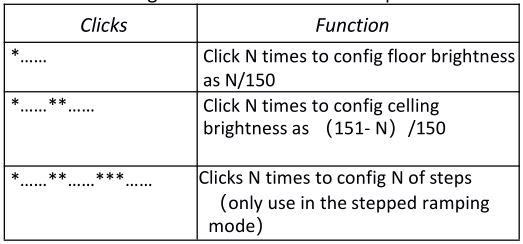
To configure the floor level, click the button equal to the number of ramp levels (out of 150) at which the floor should be. To set the lowest possible level, click once.
To configure the ceiling level, each click goes one level lower. So 1 click sets the highest possible level, 2 clicks is the 2nd-highest, 3 clicks is the 3rd-highest level, etc. To set the default of 120/150, click 31 times.
When configuring the number of steps, the value can be anything from 2 to 150.

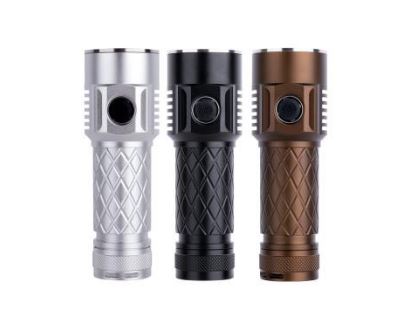
Haikelite Web: http://haikelite.topHaikelite : https://Haikelite.es.aliexpress.comWelcome to our website, we will be happy to serve you. There are more interesting and exciting flashlights for your choosing.
Haikelite HK4S Options for Luminus-SST20 / Luminus-SST40 User Manual – Haikelite HK4S Options for Luminus-SST20 / Luminus-SST40 User Manual –
[xyz-ips snippet=”download-snippet”]

